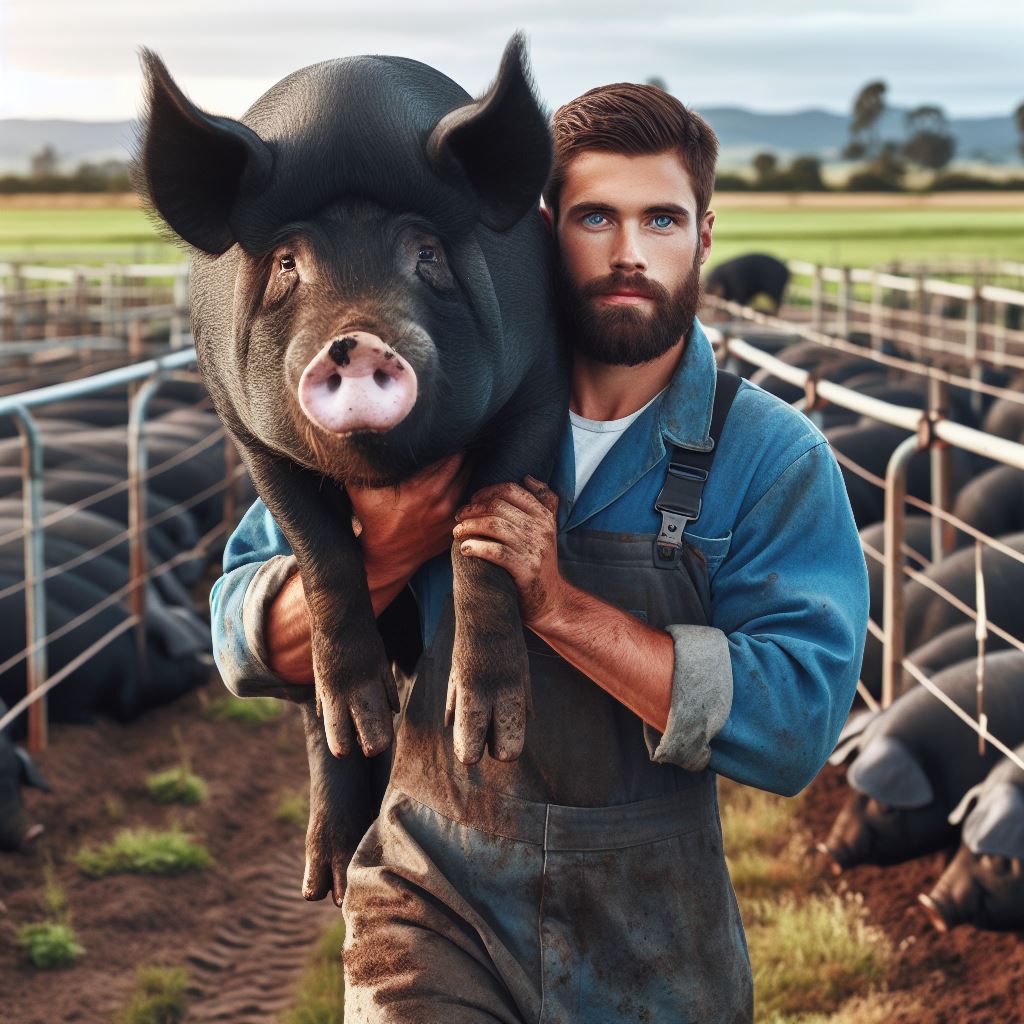Top Breeds for Profitable Pig Farming
Last Updated on January 26, 2024
Introduction
Embarking on the journey of profitable pig farming requires a strategic blend of knowledge, innovation, and efficient practices.
In this exploration, we’ll delve into key considerations, from optimal breeding and nutrition to effective management strategies, guiding you towards a successful and lucrative pig farming venture.
Profitable pig farming
This is a lucrative business that requires selecting the right pig breeds.
Profitable pig farming hinges on strategic planning, efficient resource utilization, and a focus on health and productivity.
Selecting the right breeds, implementing sound management practices, and optimizing feed efficiency contribute to higher yields.
Continuous monitoring, disease prevention, and market awareness ensure sustained profitability in the pig farming venture.
Read: Essential Pig Nutrition for Growth
Factors to Consider in Selecting Pig Breeds for Profitable Farming
Choosing the correct pig breeds is crucial for maximizing profitability in pig farming.
Market demand for pig products
- Determine the demand and popularity of different pig products in the local market.
- Choose breeds that are known for producing high-quality meat and are in demand.
- Consider the price and market value of the products that can be derived from the chosen breed.
Feed conversion rate and efficiency
- Select pig breeds that have a high feed conversion rate, meaning they efficiently convert feed into meat.
- Efficient feed conversion results in lower feed costs and higher profitability in pig farming.
- Breeds that grow quickly and efficiently utilize their feed are ideal for profitable farming.
Disease resistance and overall health
- Prioritize pig breeds that have a high level of resistance to common diseases in your region.
- Healthy pigs have lower veterinary expenses and higher chances of survival, leading to profitability.
- Research breeds that are known for their overall health and have good disease resistance records.
Growth rate and maturity period
- Look for pig breeds that have a fast growth rate and reach market weight in a relatively short period.
- Faster growth rate maximizes profitability by reducing the time and cost of raising pigs.
- Consider the maturity period and choose breeds that meet the desired market timeline for selling products.
Potential for reproductive success
- Evaluate the reproductive abilities of different pig breeds, including litter size and fertility.
- Higher reproductive success means a larger number of piglets produced, leading to increased profitability.
- Consult with experts or experienced farmers to identify breeds with a proven track record of reproductive success.
Adaptability to local climate and conditions
- Consider the climate and environmental conditions of your farm when selecting pig breeds.
- Choose breeds that can adapt well to the local climate, reducing the need for expensive climate control measures.
- Breeds that thrive in the local conditions have a higher chance of performing well and being profitable.
Furthermore, By carefully considering these factors, pig farmers can select the most suitable breeds for profitable farming.
Market demand, feed efficiency, disease resistance, growth rate, reproductive success, and adaptability all play crucial roles in achieving profitability in pig farming.
Conduct thorough research and seek advice from experts to make informed decisions about pig breed selection.
Remember, choosing the right breeds is essential for long-term success and profitability in the pig farming business.
Read: Effective Pig Housing Solutions
Top Breeds for Profitable Pig Farming
Yorkshire
- Brief history and characteristics of Yorkshire pigs: Yorkshire pigs originated in England and are known for their large size and lean meat.
- Advantages and profitability potential of Yorkshire pigs: Yorkshire pigs grow quickly and efficiently convert feed into meat, making them profitable for farmers.
- Considerations when raising Yorkshire pigs: Yorkshire pigs require proper nutrition and spacious housing to thrive.
Duroc
- Brief history and characteristics of Duroc pigs: Duroc pigs have a rich history in the United States and are valued for their exceptional meat quality and marbling.
- Advantages and profitability potential of Duroc pigs: Duroc pigs have excellent feed efficiency and their meat is highly sought-after in the market, leading to profitability.
- Considerations when raising Duroc pigs: Duroc pigs can be prone to obesity, so farmers must provide a balanced diet and monitor their weight closely.
Hampshire
- Brief history and characteristics of Hampshire pigs: Hampshire pigs originated in the United States and are known for their muscular build and high-quality meat.
- Advantages and profitability potential of Hampshire pigs: Hampshire pigs have good growth rates and their meat is flavorful and tender, making them profitable for farmers.
- Considerations when raising Hampshire pigs: Hampshire pigs are active and require adequate space and exercise to prevent boredom and ensure their well-being.
Landrace
- Brief history and characteristics of Landrace pigs: Landrace pigs originated in Denmark and are characterized by their long bodies, long snouts, and excellent mothering abilities.
- Advantages and profitability potential of Landrace pigs: Landrace pigs have high reproduction rates and are efficient in converting feed into meat, making them profitable for farmers.
- Considerations when raising Landrace pigs: Landrace pigs require good maternal care and proper housing with adequate space to ensure the well-being of both sows and piglets.
Essentially, when it comes to profitable pig farming, choosing the right breed is crucial.
Yorkshire pigs are known for their large size and efficient growth, making them a profitable choice.
Duroc pigs, with their exceptional meat quality, also offer great profitability potential.
Hampshire pigs are valued for their muscular build and flavorful meat.
Landrace pigs, with their high reproduction rates and excellent mothering abilities, can be a profitable option as well.
However, it is important to consider the specific needs and requirements of each breed to ensure successful pig farming ventures.
Read: Swine Flu: Protecting Your Pig Herds

Other Promising Pig Breeds for Profitability
Berkshire pigs
Renowned for their high-quality meat and excellent marbling, Berkshire pigs stand out as a popular choice among pig farmers.
They sport a characteristic black color with white markings on their face, legs, and tail. Consumers and restaurants alike highly demand the delicious, flavorful, and tender pork from Berkshire pigs.
Additionally, their docile temperament and ease of handling make them suitable for both small-scale and large-scale pig farming operations.
Poland China pigs
Poland China pigs are a breed that originated in the United States and is recognized for its exceptional growth and feed efficiency.
These pigs have a distinct black color with white markings, particularly on their face and feet.
Poland China pigs are known for their meat quality, which is favorable for bacon production due to the high percentage of lean meat.
Additionally, they have a calm disposition and adapt well to various environments, making them suitable for different farming conditions.
Pietrain pigs
Pietrain pigs are highly valued for their lean and muscular build, making them ideal for meat production.
These pigs are characterized by their distinctive black and white pelt, with bold black spots on a white background.
Pietrain pigs have a reputation for producing meat with exceptional lean meat content and a firm texture.
However, it is important to note that they have a higher propensity for stress sensitivity and may require more careful handling and management.
Tamworth pigs
Tamworth pigs are an ancient breed originally from England.
Their reddish-golden hair, long snouts, and large, upright ears define Tamworth pigs.
Farmers favor them for excellent foraging abilities, making them ideal for free-range or pasture-based systems.
Furthermore, they yield well-marbled, juicy, and flavorful meat, appealing to many consumers with a traditional pork taste.
Tamworth pigs exhibit hardiness and adaptability, thriving in various climatic conditions.
In summary, profitable opportunities exist with other pig breeds: Berkshire for high-quality meat, Poland China for growth rate and feed efficiency, and Pietrain for lean meat production.
Tamworth pigs stand out for their foraging prowess and delectable meat.
Depending on specific market demands and farming conditions, selecting the appropriate breed can significantly contribute to the overall profitability of pig farming ventures.
Read: Pig Farming: Pasture vs. Indoor
Conclusion
Recap on the importance of selecting profitable pig breeds.
Finally, It is crucial to choose the right pig breeds for profitable farming.
Encouragement for farmers to consider their specific needs and circumstances.
Each farmer should evaluate their individual requirements and situation before making breed choices.
Embrace tailored solutions! Consider your specific needs and circumstances when making decisions.
Your unique context is the key to successful farming practices, ensuring optimal outcomes for both your livelihood and the well-being of your animals.
The potential for profitability in pig farming with the right breeds.
Above all, Selecting the right pig breeds can offer significant profitability opportunities in the farming industry.
Maximize profitability in pig farming by selecting the right breeds.
Choosing breeds known for high growth rates, efficient feed conversion, and superior meat quality can significantly impact financial returns.
With strategic breeding, farmers can enhance productivity, reduce costs, and position their pig farming ventures for long-term economic success.


